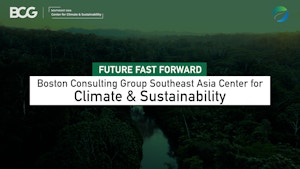Corporate Social Responsibility News

Transport
Singapore-flagged palm oil tanker dumping oily waste in Malaysian waters reveals pollution law flaw
Although it is legally permissible, critics say the discharge of waste by palm oil vessels flushing out their tanks off the coast of Malaysia is an overlooked problem.

Food & Agriculture
Sabah is creating forest corridors to save the now-endangered Borneo elephants. Will they work?
Elephant encroachment into plantation estates remain a recurring problem, Eco-Business observes on a recent visit to Sukau, Kinabatangan, where forested areas have been fragmented by thousands of hectares of oil palm sites.

Policy & Finance
Sabah’s labour law reform signals closer alignment with global standards, but child exploitation still a concern
A new bill aims to update Sabah's labour law and align Malaysia with international standards. It introduces provisions on child labour and improved protections. However, activists stress that educating workers on their rights is crucial.

Carbon & Climate
Carbon credits a ‘catalyst’ for climate action, not just a method to offset emissions: ecosecurities chief
EB Studio
Carbon financing, be it through nature or technology-based solutions, will be key to near and long-term decarbonisation in Asia. With the region’s emissions trading systems seeing some progress, regulation is still crucial to momentum and expansion.
Corporate Social Responsibility Opinion

There are growing calls for more corporate disclosure, but if firms release sustainability reports just to meet the needs of external stakeholders, including regulators, it is unlikely to motivate internal changes to business operations.

Food & Agriculture
The diet change that can also help the planet
The global food system is responsible for about 30 per cent of annual greenhouse gas emissions.

Carbon & Climate
Fossil fuel ads work on you too – here’s how
Fossil fuel firms are among the biggest spenders on Google ads that are designed to resemble search results.

Policy & Finance
The flaws in sustainability reporting
The number of ESG disclosures does not always determine quality. There should also be greater scrutiny of how companies pick topics "material" to them.
Carbon & Climate
Strengthening Asia's voice for sustainable development
Carbon & Climate
How to read sustainability reports
Corporate Social Responsibility Videos

EB Studio
Amid fresh debates about what corporate purpose should be, there is mounting evidence that corporate purpose leads to stronger brand reputation, better talent attraction and more resilience, leading to improved financial performance.

Policy & Finance
Tackling climate change in a mosaicked Asia
EB Studio
Asia's green transition pathways need to be socially inclusive given huge differences in economic development across the region, says experts at the Boston Consulting Group. State-owned enterprises have an "outsized" role to play, they add.

Carbon & Climate
Women in STEM driving sustainability
Women play a key role in developing innovations to push for sustainability, but barriers remain to their entry into STEM careers. To celebrate International Day of Women & Girls in Science, EB Impact speaks to three women in science on making an impact and pursuing careers in STEM.

In the first in a new video series where sustainability leaders interview each other about the toughest things about their jobs, Simon Lord of Malaysian palm oil giant Sime Darby Plantation went head to head with Pamela Mar of Hong Kong-based textile and apparel giant Fung Group.
Corporate Social Responsibility Podcasts

Carbon & Climate
Competence greenwashing: Are questionable ESG credentials putting climate goals at risk?
Former Monetary Authority of Singapore sustainability chief Darian McBain and recruiter Paddy Balfour tell the Eco-Business podcast why people are exaggerating their ESG expertise and why that's a problem in a key region for sustainable development.

GoTo sustainability head Tanah Sullivan tells the Eco-Business Podcast that regulating net-zero claims would decarbonise Southeast Asia faster. Indonesia's biggest internet firm aims to cut emissions to zero by 2030 — a target critics say is unrealistic.

Greenwashing has become a big problem for consumers, investors and regulators as brands spend millions on marketing their sustainability credentials. Eco-Business asked expert communicators Janissa Ng and James Lorenz why greenwashing is so dangerous, and what can be done to stop spin in sustainability communications.

Manufacturing
Sustainable packaging is here — but who will pay for it?
EB Studio
As a landmark treaty is thrashed out to tackle plastic pollution, the Eco-Business Podcast debates whether the world is ready to pay a premium for packaging that doesn't damage the planet.
Corporate Social Responsibility Press Releases

The Apurva Kempinski Bali
The Apurva Kempinski Bali announced as the first GSTC-certified hotel in Indonesia

City Developments Limited (CDL)
Rice for hope: charity relay raises over $200,000

Energy Development Corporation (EDC)
Macquarie confers ESG Award for social impact to EDC
Corporate Social Responsibility Research

Eco-Business, in partnership with Danfoss
Asia Pacific's Sustainable Cold Chain Insights

Eco-Business, supported by UiPath
Navigating ESG reporting challenges through innovation and collaboration

Normative
How to reduce supplier carbon emissions

Centre for Asian Philanthropy and Society (CAPS)
Public-private partnerships for social good















